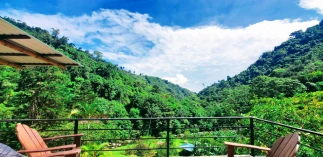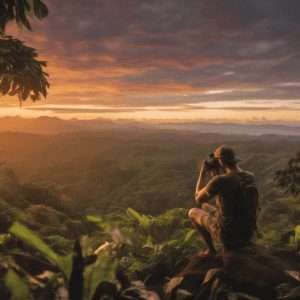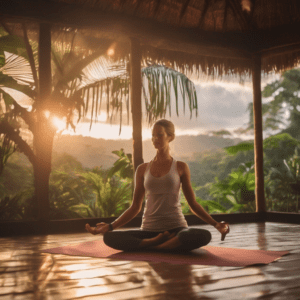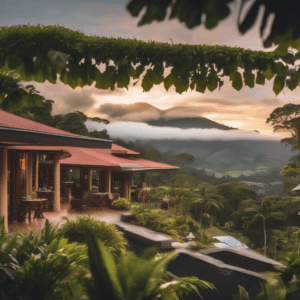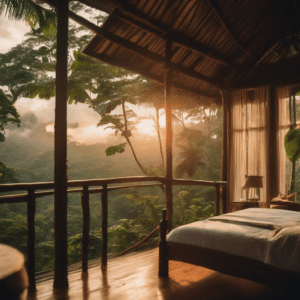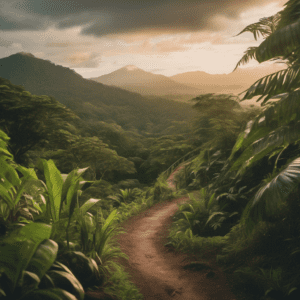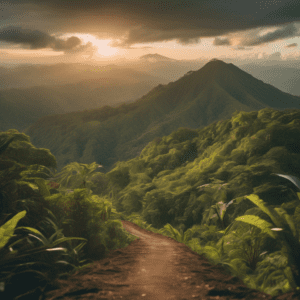The lush landscapes of Costa Rica have long inspired those seeking more than comfort—those longing for freedom that hums beneath the canopy and simplicity that restores the soul. A jungle lodge Costa Rica experience often ignites that spark: the whisper of the rainforest, the rhythm of rain on leaves, and the quiet realization that a different kind of life is possible. This life, rooted in off-grid living, is not about rejection of modernity but about choosing harmony over excess, awareness over automation, and sustainability over dependency.
Off-grid life in Costa Rica represents a deeper connection to the land and the rhythm of existence. It’s an invitation to shed unnecessary layers of noise and consumption and step into an authentic, self-sufficient flow guided by nature.
The Meaning of Off-Grid Freedom
Off-grid living in Costa Rica is more than being without public utilities—it’s about reclaiming autonomy. Power comes from the sun or streams, water from rain or natural springs, and food from fertile soil. It’s a way of saying yes to responsibility and no to waste.
The heart of this lifestyle beats with three values: freedom, simplicity, and sustainability.
- Freedom is the absence of dependence on systems that no longer serve personal or planetary health.
- Simplicity is found in daily rituals—the act of harvesting bananas, lighting a candle, or hearing the jungle before dawn.
- Sustainability ensures that each act nourishes rather than depletes the earth that sustains it.
Together, these values form a compass that directs those who wish to live deliberately rather than by default.
Why Costa Rica Is Perfect for Off-Grid Living?
Few places on earth embrace this way of life as naturally as Costa Rica. The country’s commitment to renewable energy, environmental protection, and biodiversity makes it fertile ground for sustainable living.
Over 98% of Costa Rica’s power already comes from renewable sources, proving that sustainability is not a dream—it’s a national identity. Add to that the year-round growing season, mild climate, and abundance of natural water sources, and the setting becomes ideal for those ready to step into a more grounded existence.
Costa Rica’s topography also encourages diversity in off-grid lifestyles. The cool cloud forests of Monteverde, the wild coasts of the Osa Peninsula, and the lush valleys near Turrialba all offer unique environments for those seeking different balances between isolation and access.
The Simplicity That Redefines Wealth
To live off-grid is to redefine what wealth means. It’s measured not in currency but in clarity—the clean taste of rainwater, the satisfaction of growing one’s own food, the luxury of silence.
Simplicity here is not deprivation. It’s refinement. By removing the unnecessary, life gains precision. One becomes rich in time, awareness, and connection.
It’s a slower rhythm—where work follows daylight and rest follows sunset. Technology takes a supporting role, not a leading one. Each resource—whether wood, sun, or seed—is honored through mindful use.
This balance between effort and gratitude gives off-grid living in Costa Rica a sense of grounded purpose.
Living Off the Grid: What It Really Takes
Freedom in off-grid life doesn’t come from escaping responsibility—it comes from embracing it. Each home, whether perched on a hillside or nestled deep in the jungle, is an ecosystem in miniature.
Core components of off-grid life include:
- Solar or micro-hydro energy systems to generate electricity.
- Rainwater collection and filtration systems for pure, renewable water.
- Composting toilets and biodigesters for waste management.
- Organic gardens and permaculture design for self-sufficiency.
- Natural construction materials—bamboo, reclaimed wood, or earthen plaster.
Building and maintaining these systems requires patience, adaptability, and an intimate knowledge of local conditions. The reward is profound independence—a direct relationship between effort and outcome.
The Rhythm of a Day Off the Grid
A day in off-grid Costa Rica begins with nature’s alarm—the cries of howler monkeys and the chatter of toucans. The sun, not a screen, sets the pace. Coffee brewed from locally grown beans fills the air as the solar panels begin their quiet work.
Tasks flow with purpose: tending gardens, checking water filters, repairing a solar line, or harvesting papayas. There’s labor, but also balance. Afternoons might be spent reading in the shade, walking forest trails, or swimming in a nearby stream.
As dusk arrives, light fades softly. Candlelight replaces bulbs, stars replace notifications, and conversation replaces constant noise. The day feels whole—a rare and sacred quality in a world that rushes without pause.
The Deep Connection to Nature
Living off-grid in Costa Rica isn’t just about sustainability—it’s about intimacy with the environment. The forest isn’t scenery; it’s home, teacher, and neighbor.
Every change in weather, every shift in birdcall, becomes part of daily awareness. This deep attunement cultivates not just ecological mindfulness but emotional balance.
It’s common for off-grid residents to describe how time expands. Life becomes less about achieving and more about experiencing. The jungle’s rhythm replaces the artificial pulse of urban life, offering something rare—presence.
Sustainability as Daily Practice
In Costa Rica, sustainability is not a slogan—it’s a lifestyle pattern, woven into every decision. Off-grid living amplifies this ethos through direct engagement.
For example:
- Waste becomes compost or biofuel.
- Rainwater becomes a shower, then nurtures the garden.
- Sunlight powers both home and food preservation.
These cycles remind residents of their place within the larger ecosystem. Each action carries consequence, but also opportunity—to live without leaving scars.
Over time, this awareness evolves into wisdom, where human activity supports rather than subtracts from the natural world.
Challenges That Shape the Experience
Off-grid living in Costa Rica is romanticized for its beauty, but reality adds nuance. Nature demands respect—and adaptation.
Common challenges include:
- Heavy rainfall can damage solar equipment or block roads.
- Humidity and pests that affect food storage and maintenance.
- Access limitations during the wet season.
- Isolation for those unaccustomed to solitude.
- Initial setup costs for systems and infrastructure.
Yet these challenges are part of the transformation. They strip away complacency and replace it with resilience. Each solved problem becomes a skill, each storm a reminder of nature’s might—and generosity.
The Human Side of Off-Grid Life
While off-grid living celebrates solitude, it doesn’t exclude connection. In Costa Rica, off-grid communities have quietly flourished—small clusters of individuals who share resources, trade produce, and support one another through storms and harvests.
This balance between independence and interdependence defines the healthiest form of sustainability. True freedom, after all, does not mean isolation—it means choice.
Those who live off-grid often speak of stronger relationships, both with others and themselves. Without distraction, communication deepens. Without abundance, appreciation grows.
Architecture That Breathes
Off-grid architecture in Costa Rica blends functionality with harmony. Homes are designed to breathe with the environment rather than resist it. Open layouts invite air flow; high ceilings release heat; wide eaves protect from rain.
Natural materials like bamboo, teak, and clay maintain comfort while minimizing environmental impact. Many designs follow bioclimatic principles—homes that regulate temperature naturally, reducing or eliminating energy dependence.
This architectural style doesn’t merely shelter—it participates in the environment. Each home becomes a quiet testament to coexistence.
Food: The Root of Connection
Nothing embodies simplicity and sustainability more vividly than food. Off-grid residents often cultivate abundant gardens filled with tropical staples—plantains, yucca, mango, papaya, cacao, and herbs.
Core aspects of off-grid food living:
- Permaculture gardens that regenerate soil.
- Seed saving to maintain biodiversity.
- Composting systems that feed future crops.
- Local trade for variety and community resilience.
The act of growing, harvesting, and preparing food turns nourishment into ritual. Meals are no longer hurried—they’re shared, appreciated, and seasonal.
Balancing Modernity and Minimalism
Off-grid doesn’t mean primitive. Many residents integrate technology selectively—solar refrigeration, satellite internet, or energy-efficient lighting. The difference lies in awareness: technology serves, not dominates.
This balance defines modern off-grid living. Comfort is maintained without dependency. Life slows down without disconnecting completely.
Costa Rica’s supportive environment makes this possible—modern infrastructure exists when needed, but nature still sets the rhythm.
Financial Realities and Rewards
At first glance, off-grid living may seem expensive due to setup costs—solar panels, batteries, and water systems require investment. But once established, monthly expenses drop dramatically.
Freedom from utility bills, reduced consumption, and homegrown food create long-term savings. More importantly, the lifestyle yields non-monetary wealth: health, tranquility, and satisfaction.
Many who transition to this way of life describe not losing luxury but redefining it. Luxury becomes time, silence, and space to think.
Off-Grid Ethics and the Bigger Picture
Off-grid living extends beyond personal freedom—it’s an act of ecological responsibility. Every watt of self-generated power, every bucket of collected rain, reduces the strain on public systems and natural resources.
By embodying sustainable principles, off-grid residents become quiet examples of what’s possible when human life aligns with environmental integrity. They don’t simply talk about climate solutions—they live them daily.
This alignment reflects Costa Rica’s national ethos—peaceful coexistence, ecological mindfulness, and progressive energy independence.
The Emotional Transformation
There’s an emotional shift that happens after months or years of off-grid living. Silence becomes music, effort becomes meditation, and simplicity becomes liberation.
Many residents describe a newfound patience. Life slows to match natural cycles—the rain nourishes, the sun energizes, and the night restores.
Technology’s constant pull fades, replaced by awareness of small moments: the scent of rain-soaked soil, the call of distant toucans, the warmth of handmade bread. These details, once overlooked, become the essence of contentment.
Community and Cooperation
While some prefer isolation, many off-grid dwellers participate in broader movements—sustainable farming cooperatives, reforestation projects, and eco-education initiatives.
Such collaboration doesn’t diminish independence—it enhances it. Shared goals strengthen resilience and create meaningful impact. The blend of autonomy and contribution defines a balanced off-grid existence in Costa Rica.
Resilience in a Changing Climate
Costa Rica’s natural diversity brings both beauty and unpredictability. Climate resilience has become an integral part of off-grid living—systems designed to withstand fluctuating rainfall, intense storms, and shifting ecosystems.
Sustainable architecture, regenerative agriculture, and water management all play critical roles. The ability to adapt—to change systems as the environment changes—defines long-term success.
Off-grid living, in this context, becomes both personal refuge and climate action.
Why People Choose This Path?
Those who choose off-grid life in Costa Rica come from diverse backgrounds but share common motives:
- A desire for autonomy over dependence.
- A longing for peace and simplicity.
- A commitment to sustainable living.
- A belief that life’s purpose extends beyond consumption.
- A yearning to reconnect with the natural rhythm of existence.
These values transcend trends—they speak to a deeper human instinct for balance.
The Sound of True Freedom
Freedom in off-grid Costa Rica doesn’t roar—it whispers. It’s in the rustle of palm leaves, the flow of clean water, the absence of artificial noise.
It’s the kind of freedom that doesn’t require escape because it’s rooted in belonging—to place, to purpose, and to one’s own choices.
This life demands presence, but it gives back authenticity. In a world that often confuses convenience with happiness, off-grid living restores clarity to both.
The Future of Off-Grid Living in Costa Rica
As sustainability continues to shape global consciousness, Costa Rica’s off-grid communities may well represent a glimpse of the future—a balance between human innovation and ecological wisdom.
The country’s supportive policies, biodiversity, and strong environmental values create fertile ground for expanding self-sufficient living models. Whether in mountain hideaways or coastal forests, the blueprint for regenerative living already thrives here.
This isn’t escapism—it’s evolution.
A Life in Balance
Off-grid Costa Rica embodies a return to essentials—a life rooted in rhythm rather than routine. It’s where simplicity is sophistication, sustainability is abundance, and freedom is found not in isolation but in connection.
Those who embrace this way of living discover that nature is not something to visit—it’s something to belong to. Each sunrise feels earned, each breath cleaner, each day purposeful.
The power of this lifestyle lies not just in independence but in alignment—the realization that the greatest luxury is living gently on the earth that gives us everything.

